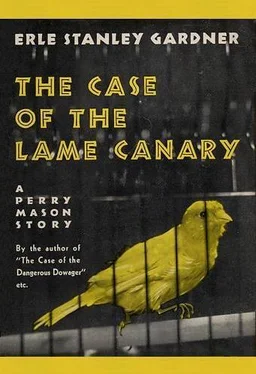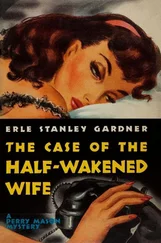Erle Gardner - The Case of the Lame Canary
Здесь есть возможность читать онлайн «Erle Gardner - The Case of the Lame Canary» весь текст электронной книги совершенно бесплатно (целиком полную версию без сокращений). В некоторых случаях можно слушать аудио, скачать через торрент в формате fb2 и присутствует краткое содержание. Город: New York, Год выпуска: 1937, Издательство: William Morrow, Жанр: Классический детектив, на английском языке. Описание произведения, (предисловие) а так же отзывы посетителей доступны на портале библиотеки ЛибКат.
- Название:The Case of the Lame Canary
- Автор:
- Издательство:William Morrow
- Жанр:
- Год:1937
- Город:New York
- ISBN:нет данных
- Рейтинг книги:4 / 5. Голосов: 1
-
Избранное:Добавить в избранное
- Отзывы:
-
Ваша оценка:
- 80
- 1
- 2
- 3
- 4
- 5
The Case of the Lame Canary: краткое содержание, описание и аннотация
Предлагаем к чтению аннотацию, описание, краткое содержание или предисловие (зависит от того, что написал сам автор книги «The Case of the Lame Canary»). Если вы не нашли необходимую информацию о книге — напишите в комментариях, мы постараемся отыскать её.
The Case of the Lame Canary — читать онлайн бесплатно полную книгу (весь текст) целиком
Ниже представлен текст книги, разбитый по страницам. Система сохранения места последней прочитанной страницы, позволяет с удобством читать онлайн бесплатно книгу «The Case of the Lame Canary», без необходимости каждый раз заново искать на чём Вы остановились. Поставьте закладку, и сможете в любой момент перейти на страницу, на которой закончили чтение.
Интервал:
Закладка:
A slow grin spread over the lawyer’s face.
“That is good news?” Helmold asked anxiously, looking over the top of his glasses.
“Very good news,” Mason said. “You know, Karl, I was commencing to think my hunches weren’t right. Now I feel a lot better. Take care of that canary, Karl.”
“Ja, ja. I take care of him. Would you like to look around and—”
“Not today, Karl. I’ll see you some other time. I’m busy right now.”
Helmold nodded genially, escorted Perry Mason to the door of the pet shop. “Any time I can do something for you, you tell me. It is a pleasure. This—” with a sweep of his hand — “talk of a lame canary, it is nothing. I wish to do something.”
Mason grinned, left the pet-shop proprietor bowing and smiling in the doorway, and sought a barber shop, where he was shaved, massaged and manicured.
Usually, hot towels on his face made him relax into a state where he was neither awake nor asleep, a peculiar, drowsy, half-dreaming condition in which, his imagination stimulated, he could see things with crystal clarity. But this time the hot towels steamed no thoughts into his mind. The canary was lame. One of the claws on the left foot had not been clipped at all. The remaining claws on that foot had been trimmed correctly. But the claws on the right foot had been trimmed too closely. And it was this which made the canary lame. Moreover, Rita Swaine, in taking the bird to the pet store, had been frank enough in referring to Mason as the person who had sent her there, but had given a fictitious name and address.
Why?
Out of the barber chair, Mason adjusted his tie, glanced at his wrist watch, and strolled leisurely back to his office. The street was filled with afternoon shadows and the advance guard of the late afternoon traffic jams.
Rounding the corner in the corridor from the elevator, he saw Della Street standing in the doorway of his private office, beckoning to him frantically, and, as he quickened his stride, she ran swiftly down the flagged floor of the building.
“Listen,” she said, “Paul Drake’s on the private line and he says he must talk with you right away.”
Mason’s long legs added another few inches to his quick stride. “How long ago did he call?”
“He’s on the line, just this minute. I recognized the sound of your steps in the corridor.”
“This his first call?”
“Yes.”
Mason said, “It may be important, Della. Don’t go home until we find out.” He pushed his way into his private office, picked up the receiver of his desk telephone and said in a low voice, “Okay, Paul, what is it?”
The slightly distorted sound of the detective’s voice showed the lawyer that Drake was holding his lips directly against the transmitter.
“Perry,” he said, “was this a run-around?”
“Was what a run-around?”
“About the divorce case.”
“No. What are you talking about?”
“I think,” Drake told him, “you’d better get out here right away.”
“Where’s ‘here’?”
“Out in front of Mrs. Stella Anderson’s place on Alsace Avenue. I’m talking from a drug store a couple of blocks away, but I’ll meet you where my car’s parked.”
“What’s the trouble?” Mason asked, frowning.
Drake lowered his voice and said, “Listen. A couple of men in a prowl car drove up, stopped at the Prescott house, opened the back door with skeleton keys, and went in. About fifteen minutes later, Sergeant Holcomb of the homicide squad came out with lots of sirens and a couple of men, and a few minutes later the coroner showed.”
Mason gave a low whistle. “Did you pick up anything, Paul?”
“Not much, but I understand the tip-off came from a Mrs. Weyman, who lives just west of the Prescott house on Fourteenth Street.”
“How did she get the tip-off?” Mason asked.
“No one knows.”
“And you don’t know who’s the corpse.”
“No.”
“You,” Mason told him, “wait for me in front of Stella Anderson’s place. I’m coming out. And let me give you a tip, Paul — don’t ever underestimate a hunch on a lame canary.”
Chapter four
Drake’s automobile was parked near a neat, but somewhat dingy-looking house, just to the north of a big two-storied residence in front of which half a dozen cars were clustered.
Mason slid his car to a stop in behind Drake’s machine. The detective joined him on the sidewalk. “They know you’re here, Paul?”
“Not yet. They haven’t spotted me.”
“Have they started asking questions of the neighbors?”
“Not yet. They’re fooling around inside the house.”
“Newspaper men?”
“Yes, a couple of those cars are Press. I got the lowdown on the Weyman tip-off from one of them.”
“Okay,” Mason said, “we haven’t much time. Let’s go. You make a stab at Mrs. Weyman, pretend you’re selling washing machines, life insurance, or investigating the auto accident. I’ll take Mrs. Snoops. Join me here. Make it snappy.”
Drake nodded, swung around the corner. Mason walked up a narrow cement walk, climbed the echoing steps of a wooden porch, and pressed his thumb against the bell button. He had rung the third time when the door was thrown open and an angular woman, whose long, bony nose fenced apart restless, glittering eyes, asked impatiently, “What do you want?”
“I’m investigating an automobile accident which took place out here—”
“Come in,” she said. “Come right in. Are you a detective?”
Mason shook his head.
For a moment there was a flicker of disappointment on her face, but she led the way into an old-fashioned living room where chairs with crocheted doilies for head and arm rests were arranged in a stiffly conventional design.
“Sit down,” she invited. “—Land sakes, I’m so excited I’m all of a tremble, what with that automobile accident this morning, and then what they’ve found over in the Prescott house. I just can’t seem to calm myself down.”
Mason seated himself, stretched his neck to peer out of the window. “What have they found in the Prescott house?” he asked.
“I don’t know,” she said, “but I think it’s a murder. And I don’t know whether I did right in not telling the officers what I saw. I suppose they’ll come over and question me, won’t they?”
Mason smiled and said, “What did you see, Mrs. Anderson?”
“Well,” she said, sitting very stiffly erect, “I saw plenty. I just said to myself, says I to myself, says I, ‘There’s something going on over in that house, and you, Stella Anderson, had better call the officers.’ ”
“But you didn’t do it?”
“Not about that. I called them about the automobile accident.”
“And you didn’t tell them about what you’d seen in the house?”
She shook her head, compressed her thin lips and said in a tone of righteous indignation, “They didn’t ask me. They didn’t even come near the house. I never had a chance to tell them, and it serves them right!”
“What!” Mason exclaimed. “They didn’t even come to talk with you after you’d put in the call for them?”
“That’s right. They came and looked over that coupe, and took down the license number and copied the registration certificate, then they talked with the young man who came out of Walter Prescott’s house, and then got in their car and drove away. They never once came near my place, not once!”
“And you’d seen something you could have told them about?” Mason asked.
“I’ll say I could.”
Mason, sizing her up with his steady, patient eyes, crossed one leg over the other, settled back in the chair and said casually, “Oh, well, if it had been important they’d have asked you about it.”
Читать дальшеИнтервал:
Закладка:
Похожие книги на «The Case of the Lame Canary»
Представляем Вашему вниманию похожие книги на «The Case of the Lame Canary» списком для выбора. Мы отобрали схожую по названию и смыслу литературу в надежде предоставить читателям больше вариантов отыскать новые, интересные, ещё непрочитанные произведения.
Обсуждение, отзывы о книге «The Case of the Lame Canary» и просто собственные мнения читателей. Оставьте ваши комментарии, напишите, что Вы думаете о произведении, его смысле или главных героях. Укажите что конкретно понравилось, а что нет, и почему Вы так считаете.












